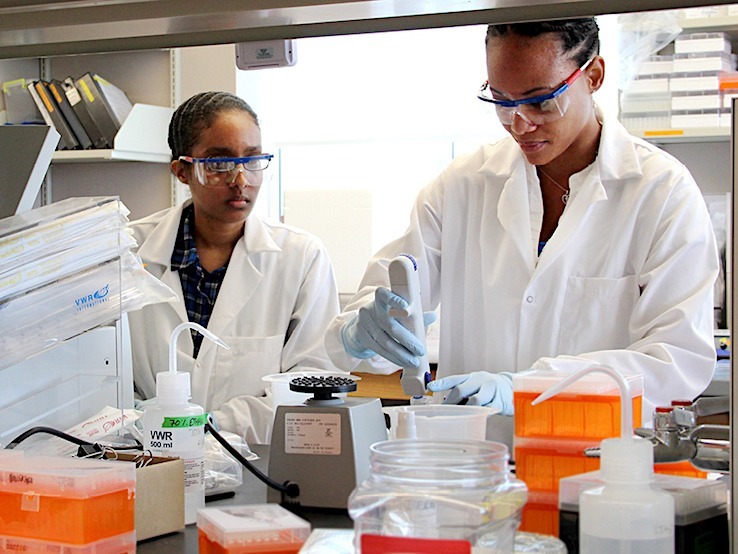News
Our research not only influences the scientific community, but the general public as well. We strive to share our discoveries with everyone. Read some of our latest articles on what is happening at the Nutrition Research Institute.
The Ironies of Iron During Pregnancy
August 28, 2017 – Iron is listed by the American Pregnancy Association as one of the nutrients essential for healthy fetal development. Why? Because a lack of iron, a mineral naturally found in foods like meat, seafood and vegetables, directly impacts the development of the fetal brain. Iron also prevents anemia, low birth weight and premature delivery. Unfortunately, 22 percent of US women in their childbearing years are iron deficient, says Susan Smith, PhD, deputy director of science at the UNC Nutrition Research Institute on the NC Research Campus.
UNC-CH Nutrition Research Institute Graduate Student Housing Opens Steps Away from NCRC Main Campus
June 27, 2017 • The Nutrition Research Institute (NRI) offers unique learning and work experiences for graduate students in the fields of nutrigenomics and metabolomics. Our research relies, in fact, on the work these students do. But until recently the institute has been short on student housing, creating hardship for those who wished to study and work here. That has changed with the opening of five newly refurbished houses a short walk from the institute and the rest of the North Carolina Research Campus, offering both short- and long-term student housing options.
Maternal Vitamin D For Preventing Autism
July 27, 2017 – Vitamin D deficiency in pregnant moms is shown to negatively affect fetal growth and children’s health in the long run. Deficient gestational vitamin D status is surprisingly high both globally and in the US. One of the findings that draws attention is the role of vitamin D during pregnancy in children’s chances of developing Autism Spectrum Disorders (ASD). Vitamin D is acquired through sun exposure or food intake. The circulating form of vitamin D can travel through the fetal-placental barrier, thus, developing babies depend solely on their mothers for getting this beneficial nutrient.
Precision Nutrition Needed for Healthy Military Muscles
July 27, 2017 • “Eat colorful meals and make sure you get enough choline.” That’s the key advice offered by David Nieman, Dr.PH, FACSM, Director of the Appalachian State University Human Performance Laboratory; and Steven Zeisel, M.D., Ph.D., Director of the University of North Carolina at Chapel Hill’s Nutrition Research Institute. during lunch at the Medical, BioMedical & BioDefense: Support the Warfighter symposium in Chapel Hill in June. These were among several surprising findings […]
Cheatham Named to Education Board
July 27, 2017 – Carol L. Cheatham, PhD, has been selected to join the Education Board at the American Health Council. The council, comprising leaders and contributors from all areas of healthcare, is America’s leading organization in health awareness and advancement. Dr. Cheatham will share her knowledge and expertise on the effects of nutrition on brain development and function. […]
Choline Biomarker Study Call for Participants
August 28, 2017 – The Zeisel Lab at the NRI is recruiting participants for a clinical study on the essential nutrient choline. The lab needs healthy females and males between the ages of 17 and 70 to take part in a six-week study. Participants will be asked to provide blood samples and will eat meals provided by the NRI during the course of the study. “Healthy” means normal body weight, and no smoking, drug abuse, unusual diets, allergy to soy, or chronic diseases. All qualifying participants will be paid when they complete the study.
You Can Help Advance Our Science
July 27, 2017 – The Zeisel Lab at the NRI is recruiting participants for a clinical study on the essential nutrient choline. The lab needs healthy females and males between the ages of 17 and 70 to take part in a six-week study. Participants will be asked to provide blood samples and will eat meals provided by the NRI during the course of the study. “Healthy” means normal body weight, and no smoking, drug abuse, unusual diets, allergy to soy, or chronic diseases. All qualifying participants will be paid when they complete the study.
Female Tea Drinkers See Epigenetic Changes in Cancer and Hormone Genes
June 27, 2017 • That morning or midday beverage may have a greater effect on our genes than previously thought, especially if you happen to be female and consume tea on a regular basis. New evidence from a group of investigators at Uppsala University shows that tea consumption in women leads to epigenetic changes in genes that are known to interact with cancer and estrogen metabolism. Findings from the new study were published recently in Human Molecular Genetics in an article entitled “Tea and Coffee Consumption in Relation to DNA Methylation in Four European Cohorts.”
NRI Grooms Next Gen Scientists
June 27, 2017 • Grant Canipe didn’t always know that he wanted to be a scientist. His revelation came one day at Northwest Cabarrus High School in Concord, NC, when a Duke University student came to Canipe’s AP biology class to discuss his research and plans for graduate school. Canipe found himself inspired by that student’s experience so much that he himself is now completing his doctorate at UNC Chapel Hill in developmental psychology and nutrition. He studies under the direction of Carol L. Cheatham, Ph.D. in the Cheatham Nutrition & Cognition Laboratory at the UNC Nutrition Research Institute (NRI), located on the North Carolina Research Campus in Kannapolis. […]
Support the NRI
By donating to the Nutrition Research Institute, your money targets the root of most American disease. Our scientists focus on how our genes respond to food so that soon medical practitioners will be able to guide people in their health from childhood through old age. Our critical research depends on the generosity of people like you.

